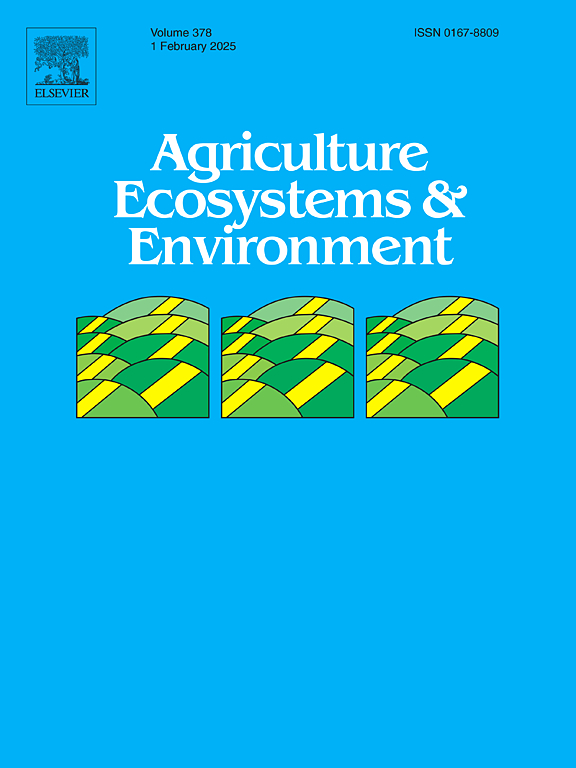Linking stable soil carbon and microbes using rapid fractionation and metagenomics assays – First results screening fungal inoculants under wheat crops
IF 6.4
1区 农林科学
Q1 AGRICULTURE, MULTIDISCIPLINARY
引用次数: 0
Abstract
Increasing soil carbon in agricultural systems can help mitigate and eventually reverse climate change. Soil microorganisms play a key role in regulating soil carbon accrual and stability. Questions remain about the link between microbes and soil carbon outcomes and how to leverage microbial processes. Here we screen microbial inoculation (endophytic fungal isolates) regarding their effects on soil carbon in a wheat pot trial using a rapid soil carbon fractionation assay and link the results with microbial community structure and function observations. Under the specific chemical and biological conditions of the plant-soil-environmental system, two of the 17 fungi tested increased soil carbon in close proximity to the roots by ∼15 %. This increase was associated with the medium stable, soil aggregate organic matter fraction (up to +21 %) and also mineral-associated organic matter, the long-term soil carbon storage (+10 %). Some of these changes were linked to a shift in predicted functional genes (whole metagenome, long read sequencing) and an increase in bacterial and fungal biomass (phospholipid fatty acid analysis). Microbial inoculation did not induce a statistically significant shift in the microbial composition (metagenomics), which, instead, correlated with the labile, particulate organic matter pool. While it is unclear whether the two endophytes directly influenced soil carbon cycling or had an indirect effect, through altering existing microbial processes, it demonstrates their potential for positive impacts on soil carbon that needs confirming in field trials. The combination of high throughput assays we present here could further help link carbon stability with microbial indicators and build more accurate soil carbon models.
利用快速分离和宏基因组学分析将稳定的土壤碳和微生物联系起来。筛选小麦作物下的真菌接种剂的初步结果
增加农业系统中的土壤碳可以帮助减缓并最终扭转气候变化。土壤微生物在调节土壤碳积累和稳定中起着关键作用。关于微生物和土壤碳结果之间的联系以及如何利用微生物过程的问题仍然存在。在此,我们使用快速土壤碳分级法筛选微生物接种(内生真菌分离物)对小麦盆栽试验土壤碳的影响,并将结果与微生物群落结构和功能观察联系起来。在植物-土壤-环境系统的特定化学和生物条件下,17种真菌中有两种使根部附近的土壤碳含量增加了~ 15% %。这种增加与中稳定的土壤团聚体有机质分数(高达+21 %)和矿物相关有机质,土壤长期碳储量(+10 %)有关。其中一些变化与预测功能基因的变化(全宏基因组,长读测序)和细菌和真菌生物量的增加(磷脂脂肪酸分析)有关。微生物接种并没有引起微生物组成(宏基因组学)的统计学显著变化,相反,微生物组成与不稳定的颗粒有机物库相关。虽然目前尚不清楚这两种内生菌是直接影响土壤碳循环还是通过改变现有的微生物过程产生间接影响,但它表明它们对土壤碳有潜在的积极影响,这需要在田间试验中得到证实。我们在这里提出的高通量分析的组合可以进一步帮助将碳稳定性与微生物指标联系起来,并建立更准确的土壤碳模型。
本文章由计算机程序翻译,如有差异,请以英文原文为准。
求助全文
约1分钟内获得全文
求助全文
来源期刊

Agriculture, Ecosystems & Environment
环境科学-环境科学
CiteScore
11.70
自引率
9.10%
发文量
392
审稿时长
26 days
期刊介绍:
Agriculture, Ecosystems and Environment publishes scientific articles dealing with the interface between agroecosystems and the natural environment, specifically how agriculture influences the environment and how changes in that environment impact agroecosystems. Preference is given to papers from experimental and observational research at the field, system or landscape level, from studies that enhance our understanding of processes using data-based biophysical modelling, and papers that bridge scientific disciplines and integrate knowledge. All papers should be placed in an international or wide comparative context.
 求助内容:
求助内容: 应助结果提醒方式:
应助结果提醒方式:


